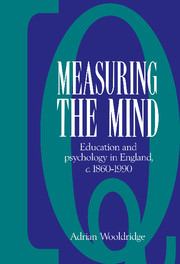Book contents
- Frontmatter
- Contents
- Acknowledgements
- List of abbreviations
- 1 Introduction
- 2 Studying childhood
- 3 The invention of educational psychology
- 4 Cyril Burt and the psychology of individual differences
- 5 Susan Isaacs and the psychology of child development
- 6 The structure and status of a profession
- 7 Mental measurement and the meritocratic ideal
- 8 The psychometric perspective
- 9 Psychologists as policy makers, 1924–1944
- 10 The measurement of merit anatomised
- 11 Equality and community versus merit
- 12 Egalitarianism triumphant
- 13 Cyril Burt and the politics of an academic reputation
- 14 Equality and human nature
- 15 The measurement of merit revived?
- 16 Conclusion
- Glossary
- Selective bibliography
- Index
16 - Conclusion
Published online by Cambridge University Press: 11 March 2010
- Frontmatter
- Contents
- Acknowledgements
- List of abbreviations
- 1 Introduction
- 2 Studying childhood
- 3 The invention of educational psychology
- 4 Cyril Burt and the psychology of individual differences
- 5 Susan Isaacs and the psychology of child development
- 6 The structure and status of a profession
- 7 Mental measurement and the meritocratic ideal
- 8 The psychometric perspective
- 9 Psychologists as policy makers, 1924–1944
- 10 The measurement of merit anatomised
- 11 Equality and community versus merit
- 12 Egalitarianism triumphant
- 13 Cyril Burt and the politics of an academic reputation
- 14 Equality and human nature
- 15 The measurement of merit revived?
- 16 Conclusion
- Glossary
- Selective bibliography
- Index
Summary
Educational psychology made rapid advances in the decades after 1880. In the 1880s the educated possessed only a rudimentary knowledge of children's mental abilities and emotional development. What passed for science rested on bizarre and often harmful assumptions. The Child Study movement based its case on two easily discredited arguments: that the development of the child recapitulated the development of the race, and that the body was a mirror of the mind. Psychologists and doctors had no feasible definition of ‘intelligence’, and no reliable method for measuring what they failed to understand; Francis Warner estimated children's mental powers by measuring the size of their skulls until well into the 1890s.
And yet by the 1920s the subject had been reorganised on entirely new foundations. Psychologists organised themselves into a professional community and won a recognised place in a hostile academic world and an impoverished school system. They developed and adapted group and individual intelligence tests, which were sophisticated, if controversial, measuring devices, and produced a voluminous, and increasingly technical, body of literature and evidence. They debated the nature and meaning of ‘intelligence’ at an impressive level of sophistication, with three main schools advancing different definitions of the term, and they investigated backward, delinquent and neurotic, as well as normal children; at the same time they furnished government committees with important evidence on the mental and emotional development of schoolchildren. They also made significant contributions to such diverse areas as educational theory, political arithmetic, and statistical method.
Information
- Type
- Chapter
- Information
- Measuring the MindEducation and Psychology in England c.1860–c.1990, pp. 409 - 420Publisher: Cambridge University PressPrint publication year: 1994
